(Fifth Sunday in Ordinary Time-Year B; This homily was given on February 3 & 4, 2024 at Saint Augustine Church in Providence, Rhode Island; See Job 7:1-7 and Mark 1:29-39)

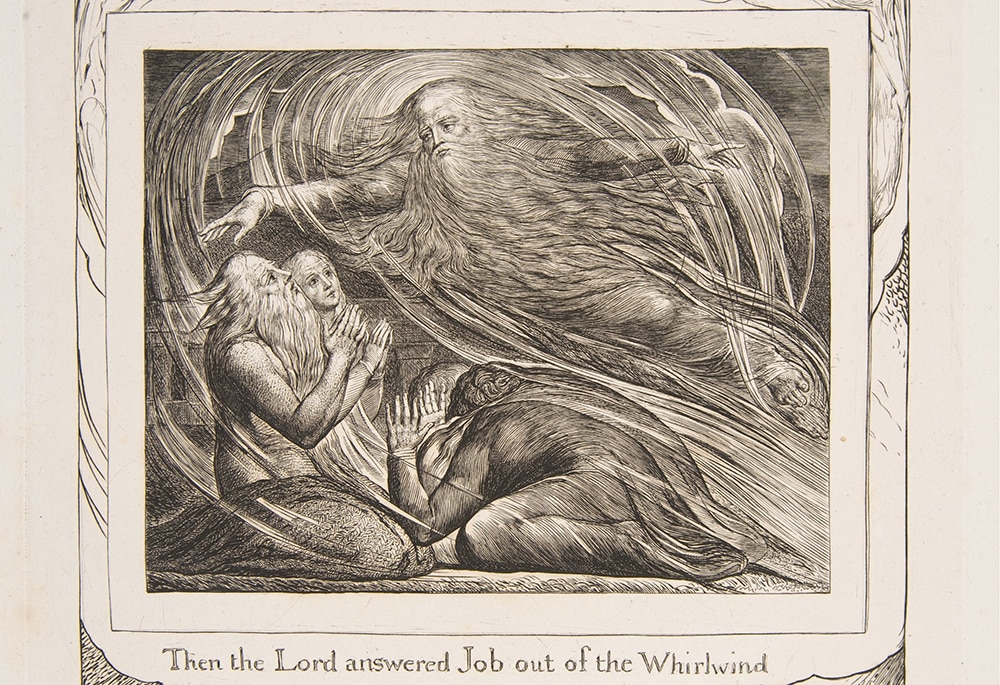

Lots of people complain — and figure they’ve got good reason to do so. But who can compare to Job? When God bragged about how good Job was, Satan replied that it’s easy to be good when everything goes your way — when you have a secure home, a good family and a wonderful reputation. Who wouldn’t thank God for all of that? But, what happens when it all falls apart through no fault of your own? That was Satan’s gamble — let Job lose it all, and then see what he thinks of God!
Suddenly bereft of everything that had given him identity and purpose, Job finds life a drudgery. He can identify with people with no pride in their work as they gain a poor salary, never feeling that they are contributing to the world or expressing themselves through their labor. Growing old, Job’s life has lost its meaning and his friends, insisting that he must have deserved his misfortune, only make it worse. This is where we meet Job today.
Although few knew anything like Job’s abundance of loss, the people of Jesus’ day, like many today, shared Job’s sense of drudgery, wondering if the God of justice had fallen asleep. When Mark describes the Galilee where Jesus began preaching, it seemed that demons were overpowering the population and that a good number of those who weren’t possessed were in need of healing. No wonder Jesus started out like a whirlwind! Mark’s first chapter tells us that Jesus was baptized and went to the desert to return and immediately began to teach, call disciples, exorcize demons and heal the sick. (He performed his first healing miracle, the restoration of Peter’s mother-in-law, right after the Sabbath ended — showing that God was active among the people, no matter how wretched they felt.)
Mark, whose narrative invented the genre of Christian Gospels, gave his work the title, « The beginning of the Gospel. » He wanted his readers to know that the times were changing — and quickly.
Jesus announced the change and he himself was the change. But, as Mark’s title implied, what Jesus did was just the beginning. He was no Superman, flying in and pulling people out of danger all by himself. From the get-go, he called disciples, either by inviting them to follow him, or, as in the case of Peter’s mother-in-law (let’s call her Amatallah, which means « servant of God »), by restoring their ability to serve God and neighbor.
The point of all his activity was to embody the message he preached: « This is the time of fulfillment, the reign of God is at hand, believe it and act like you believe it! » When people began to take his message seriously, it snowballed and became a self-fulfilling prophecy. The more people believed that God’s reign was at hand, the more they recognized it and spread it.
Paul puts this into the imperative as he writes to the community at Corinth. Speaking for himself, he says that knowing the Gospel impels him into mission. « Woe to me if I do not preach it! »
Paul offers a counterpoint to Job. Whereas Job tried to understand his sorry lot, Paul leads his readers to see beyond the tragedy — to see that preaching the crucified Christ proclaims not only God’s definitive victory over all the powers of destruction but gives meaning to every moment of life (1 Corinthians 1:18-25). Thus Paul, like Amatallah, is free to serve others. Their service and preaching becomes sacramental; it accomplishes what it signifies, bringing the reign of God into greater fruition.
In his lifetime, Job complained mightily to God, demanding an answer to the injustice of life. When God finally answered him, all Job could do was admit that God’s ways were beyond his comprehension (Job 38-40). The restoration of Job’s fortune does not answer the question of suffering, nevertheless, it points to Christ and the resurrection, God’s definitive response to evil.
Today we might not be very different from Job and Paul. We see innocent suffering in so many parts of our world and feel helpless to respond. It seems that evil and violence have the upper hand. But, if we can, like Paul, give ourselves over to belief in the Gospel, we can enter into the sacramental dynamic of the self-fulfilling prophecy that is the reigning of God.
Job would tell us, « Beware! Feel free to complain, to lament, to interrogate God, but know that you do so at great risk. » We never know when God will appear out of the whirlwind and give us a mission beyond our wildest dreams. A mission that will eliminate drudgery from our vocabulary, a mission for which we were made.
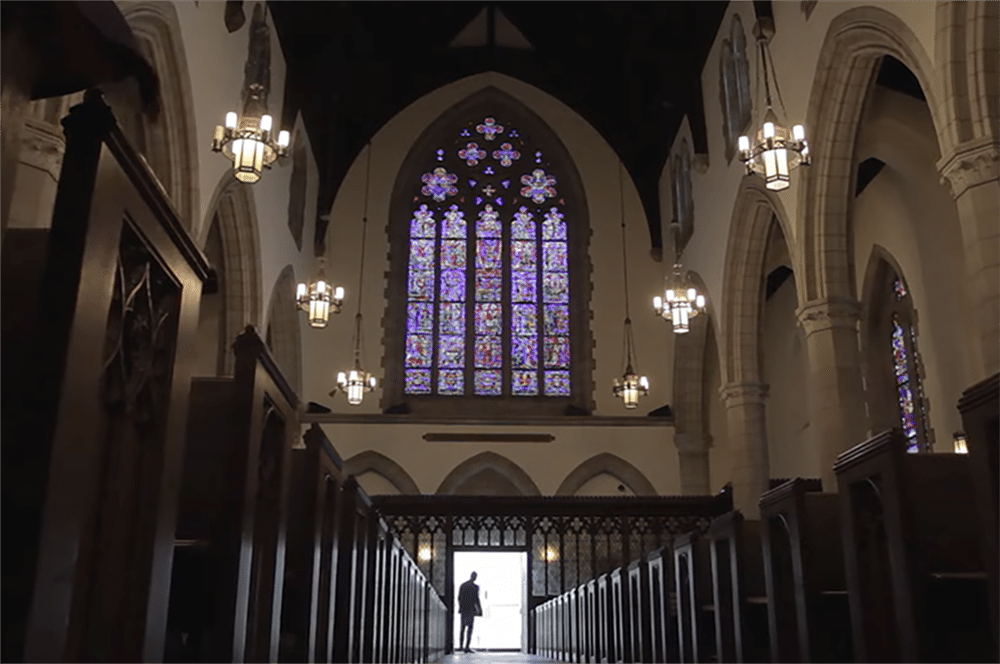

I’ve been teaching New York City high school and college students for two decades now. And for two decades, I’ve been asked the same question: « Is it OK to use ‘I’ in school writing? » The poor student has inevitably been told that first-person references weaken argumentative claims. I would actually argue that in 2024 the only thing all students — all Americans — could use a little bit more of is humility, circumspection and nuance.
In a word: doubt.
It has been 20 years since John Patrick Shanley’s explosive play of the same name premiered on Broadway, starring Cherry Jones and Brian F. O’Byrne. This February, the play returns to the Great White Way, in a revival starring Liev Schreiber as Father Flynn and Tyne Daly as Sister Aloysius. So it’s a good time to revisit this Pulitzer Prize winner (later made into an Oscar-nominated film) and the era in which Shanley wrote it.
Over the lifespan of this very Catholic play, at the center of which is a simmering conflict between a reform-minded priest and a traditionally-inclined nun, what has happened in the American Catholic Church? Has the play aged well? Or are there moments that may now make viewers cringe — or worse?
Advertisement
« It’s getting harder and harder in this society to find a place for spacious, true intellectual exchange, » Shanley told The New York Times when the play was first released. « It’s all becoming about who won the argument, which is just moronic. » He added, « There is no room or value placed on doubt, which is one of the hallmarks of the wise man. » Sadly, this may be more true in 2024 than it was in 2004.
At the same time, there are moments in Shanley’s play that read quite differently today, for better or worse. Shanley has talked often about writing « Doubt » (subtitled « a parable ») during the run-up to the disastrous Iraq War. But Americans had also begun learning about and processing the worst of the church abuse scandals at the time, including The Boston Globe’s shocking 2002 revelations, on which the film « Spotlight » was based. Allegations of cover-up, and parish-hopping by predator priests, are also at the center of « Doubt, » which is set in 1964.
« What do you do when you’re not sure? » Father Flynn asks the audience in the play’s opening sermon. « Last year when President Kennedy was assassinated, who among us did not experience the most profound disorientation? »
Shanley has called this era a time « when not just me but the whole world seemed to be going through some kind of vast puberty. » In 2004, he acknowledged that key elements of the plot of « Doubt » were rooted in personal experience.
« A child in my family was molested by a priest, » Shanley told the Times. « The parents went first to the local level, then up the chain of command to a highly placed church official, who took them by the hands and said: ‘I’m so sorry this happened to you. I will take care of it.’ And then he promoted » the abusive priest.
As similar events unfold in « Doubt, » Sister Aloysius emerges as brave, perhaps even heroic. And yet some audience members in 2024 might feel these allegations are a peripheral matter in the larger conflict between the nun and priest.
Then there is the mother of the (allegedly) abused boy.
Mrs. Muller is African American and new to this Bronx parish, which is heavily Irish and Italian. She clearly loves her son, and wants to give him as many opportunities as 1960s America (or at least Catholic New York City) will allow. At the same time, some of Mrs. Muller’s lines fall somewhere between passive and neglectful; perhaps even complicit. Still, she gets some of the play’s most powerful moments.
« How come the priest didn’t get kicked off the priesthood? » she asks at one point. « You know why that is? … You’re just finding out about it, but that’s the way it is and the way it’s been, Sister. You’re not going against no man in a robe and win, Sister. »
As audiences and critics debate what ideas may or may not remain relevant in « Doubt, » one aspect of the stage play that is worth emphasizing — especially in light of the movie, with its expanded cast — is that only four characters appear, and three are women. These are the people who’ve faced the most adversity within a deeply unbalanced system. Perhaps for this reason, they have developed the strength and persistence to serve as a breath of fresh air, represented by the wind storms that send the Irish janitor out to the courtyard to clean up scattered tree limbs. But beware: the same wind storms, Sister Aloysius notes, « tripped » a fellow nun, who « fell on her face. »
The role of women in the church was a prominent topic at the Vatican’s recent synod on synodality. Pope Francis — himself often described as a breath of fresh air — has even called for a « demasculinized » church, as well as more listening, as opposed to more talking, pontificating.
It’s no accident that the only male character in « Doubt » is also the only one we see preaching. That is, at least, when he’s not busy conspicuously jotting down sermon ideas, even if it interrupts someone trying to relay an important point to him.
But as flawed as Father Flynn may be, no one in « Doubt » emerges as an uncomplicated hero. Which may be the most crucial — and timeless — lesson in this « parable. »
« It is doubt (so often initially experienced as weakness) that changes things, » Shanley wrote in a preface to the play. « … Doubt requires more courage than conviction does … because conviction is a resting place and doubt is infinite — it is a passionate exercise. »
This is why Sister James, the young nun and teacher, may be this play’s most important character: she carefully listens, considering the arguments both Father Flynn and Sister Aloysius make. And yet, she’s still stumped. Unsure. But Sister James keeps listening. Right up to the very end of the play, when the lights fade.
Maybe that’s one final thing we can take away from « Doubt »: That sitting quietly in the dark can still be a courageous act, a passionate exercise.


NCR senior correspondent Heidi Schlumpf joins « The Francis Effect » podcast co-hosts Franciscan Fr. Daniel Horan (columnist for NCR) and David Dault, executive producer and host of « Things Not Seen: Conversations About Culture and Faith. » A jury has ruled that Donald Trump must pay $83 million for defaming E. Jean Carroll. Father Daniel, Heidi and David discuss that case, as well as the role of journalism in 21st-century Catholic life. Plus, Heidi interviews Ansel Augustine about the synod and experiences of Black Catholics.
How do I listen?
Click the « play » button at the top of the page to start the show. Make sure to keep the window open on your browser if you’re doing other things, or the audio will stop.
From your mobile device:
You can listen and subscribe to « The Francis Effect » from any podcast app. If you’re reading this from an iPhone or other Apple mobile device, tap this link to listen in Apple Podcasts. If you’re on an Android, tap this link to listen in Google Podcasts.
If you prefer another podcast app, you can find « The Francis Effect » there. (Here’s the RSS feed.)
From a desktop or laptop:
You can visit The Francis Effect website here for more information on the show.
You can also find the podcast on Twitter: @FrancisFXPod.
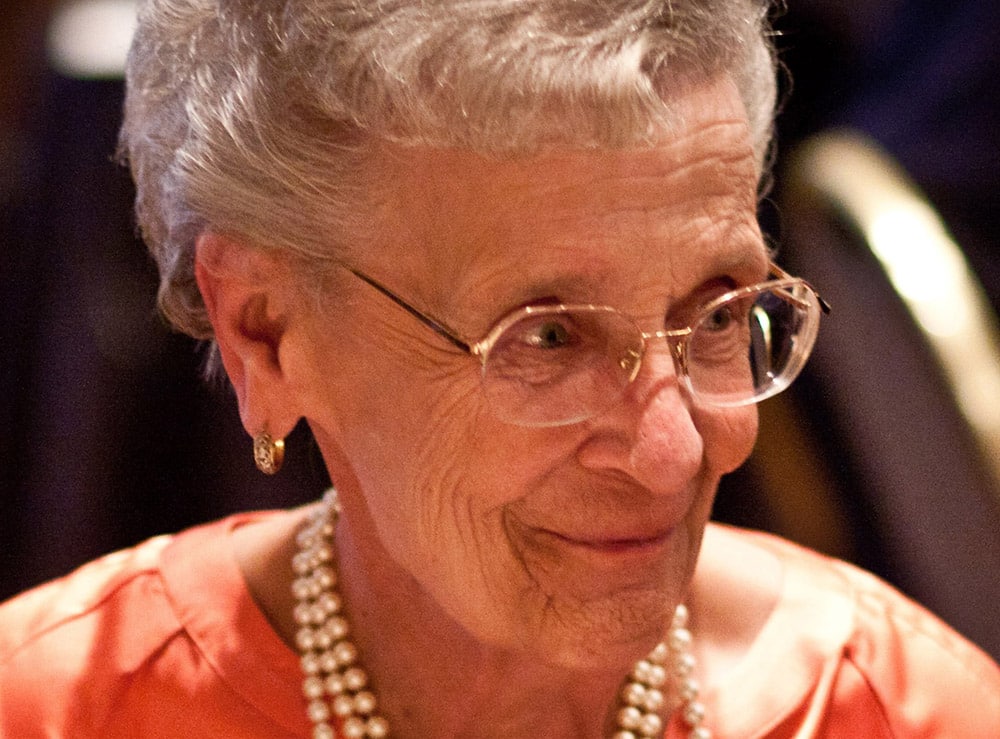

The first laywoman chancellor of a U.S. diocese — who also made a meaningful but unattributed contribution to the creation of the official Catechism of the Catholic Church — died Jan. 27.
In 1989, then-Archbishop William Levada named Mary Jo Tully chancellor for the Archdiocese of Portland, Oregon, where she would serve for 27 years before retiring in 2016.
Following her death at age 86 in Austin, Texas, colleagues recalled Tully’s candor and care for people amid life’s messiness, her talents as a catechist, wit and gravelly voice, and her fierce love for the church.
As part of her tenure and without fanfare, « she was able to help humanize the catechism, » said Fr. Joseph Mulcrone, a friend for five decades and a former senior official in the Chicago Archdiocese. « She had many gifts. »
Laypeople were not permitted to be chancellors until 1983, when Pope John Paul II promulgated the new Code of Canon Law, revised after the end of the Second Vatican Council. The post is often ranked as one of the top positions of authority after the bishop, and appointed individuals may hold a variety of responsibilities, though their principal function is to coordinate and maintain diocesan records.
« A chancellor can pretty much become whatever the bishop wants them to be, and Mary Jo served in a variety of ways masterfully — in the ecumenical office, as a liaison with health care providers, as a vicar for religious, » retired Portland Archbishop John Vlazny, another longtime friend, said in an interview Jan. 29. « She gave her life to the church. »
Advertisement
Tully wrote columns on Scripture for the Catholic Sentinel, the Portland archdiocesan newspaper shuttered in 2022, and deepened Catholic-Jewish relationships in the city. She also helped priests and laity navigate tricky interpersonal conflicts and took the toughest crank calls at the Portland pastoral center, according to former colleagues.
The daughter of Irish Catholic parents, Tully was born in Chicago in 1937 and in the 1960s marched with civil rights activists in the South.
« She was a Chicago tough with a lot of soft spots, especially for kids and immigrants, » said Ed Langlois, a longtime reporter and editor of the Sentinel.
« The Vietnamese immigrants in Portland considered her a grand matriarch, a view she openly indulged while all the time advocating for the community quietly and strongly, » he said.
Langlois recalled how Tully could be a micromanager who made life grueling for editors and reporters. But she also was « a resolute champion of our newspaper in the halls of power, » he said.
At her core, added Langlois, Tully was a catechist. « She lit up when teaching children, which she did whenever she could, despite crushing administrative duties. »
Prior to arriving in the West Coast city, Tully served as director of religious education in the Chicago Archdiocese, where she became fast friends with Mulcrone, then director of the archdiocese’s Catholic Office of the Deaf.
In a recent interview with NCR, Mulcrone recounted a story Tully told him years ago.
She’d been asked to lead a program in Chicago for parents with children preparing for first Communion. It was a required event, and clearly not everyone was thrilled to be there, said Mulcrone.
« Mary Jo goes up to give the talk, and she spots this guy about three, four rows back who’s got a look on his face like, ‘What the heck am I doing here?’
« At the end of the presentation, he came up to her and this is what he said: ‘Lady, I don’t really know a damn, but if I could learn to believe the way you believe — that would be everything. That is something I want for myself and my child.’
« And that’s who Mary Jo was, » said Mulcrone. « She was an absolute believer. »
Tully came to Portland to interview for the post of religious education director, but Levada, archbishop from 1986 to 1995, offered her a job as assistant chancellor.
« When Levada began to work with her, he realized, well, this person is a jewel, » said Vlazny. The following year, Tully became the first laywoman chancellor.
Ten years after the canonical change that opened up the position to laypeople, about 15% of chancellors in U.S. dioceses were women, according to the Center for Applied Research in the Apostolate, affiliated with Georgetown University in Washington, D.C. A decade later, about 25% were women, with half women religious and the other half lay.
In 2016, the last year the center obtained data, more than 30% were female. Current dioceses with laywomen chancellors include San Diego; Syracuse, New York; and Stockton, California; all appointments were historic firsts.
Vlazny and Mulcrone highlighted how Tully made a mark on the catechism — the reference work seen as containing the church’s essential teachings in regards to faith and morals.
« The Catechism of the Catholic Church we have today certainly bears the imprint of her touch, » said Mulcrone.
In the 1980s, Levada was part of a small group of bishops working with then-Cardinal Joseph Ratzinger, future Pope Benedict XVI, on the catechism, and he is attributed with preparing the glossary.
« But that was a lot of Mary Jo’s work, » according to Vlazny.
« Mary Jo would not have bragged about it, » Mulcrone said, « but I know for a fact there were plenty of late-night sessions and revisions, where Levada would send her stuff at night, asking what she thought about it. And she’d get back to him in the morning with her thoughts. »
Levada came to the catechism as a theologian, « as someone who really knew the formal teaching of the church, » said Mulcrone. « But Mary Jo came to the catechism saying, ‘All of that is good and important, but you have to translate this into pastoral ministry.’
« She put human flesh, humanity, onto the bones of the catechism to make them something that could be more applied in pastoral situations in a parish, » he said.
Serving under Portland Archbishops Levada, Francis George, Vlazny and Alexander Sample, Tully needed to understand diverse personalities and priorities, said Mulcrone.
« She said to me, ‘Personalities come and go, the church remains,’ » recalled the priest. « That was her attitude. »
In 2008, Pope Benedict XVI gave Tully a Pro Ecclesia et Pontifice medal, one of the highest honors a pontiff can bestow upon members of the laity and religious orders, and the University of Portland awarded her an honorary doctorate in 2000.
When Tully retired, the Sentinel ran a reflection by Brian Doyle, an award-winning author and editor of the University of Portland’s magazine.
« She worked as hard as anyone ever has for Catholics in Oregon, and she’ll never get the credit she deserves, for the thousands of meetings attended, the thousands of complaints and insults handled, the thousands of dinners endured, the countless ministries and projects and programs overseen, » wrote Doyle, who often took liberties with syntax, punctuation and sentence length.
« But then again she will never be forgotten, » Doyle continued, « which is a greater compliment than mere recognition; the lean amused witty efficient blunt woman — who in so many ways was an incarnation of the Catholic idea in Oregon for nearly three decades — will always be a colorful thread in the fabric of the faith here. »
Tully, who spent her retirement with family in Austin, will be interred in Chicago next to her mother.
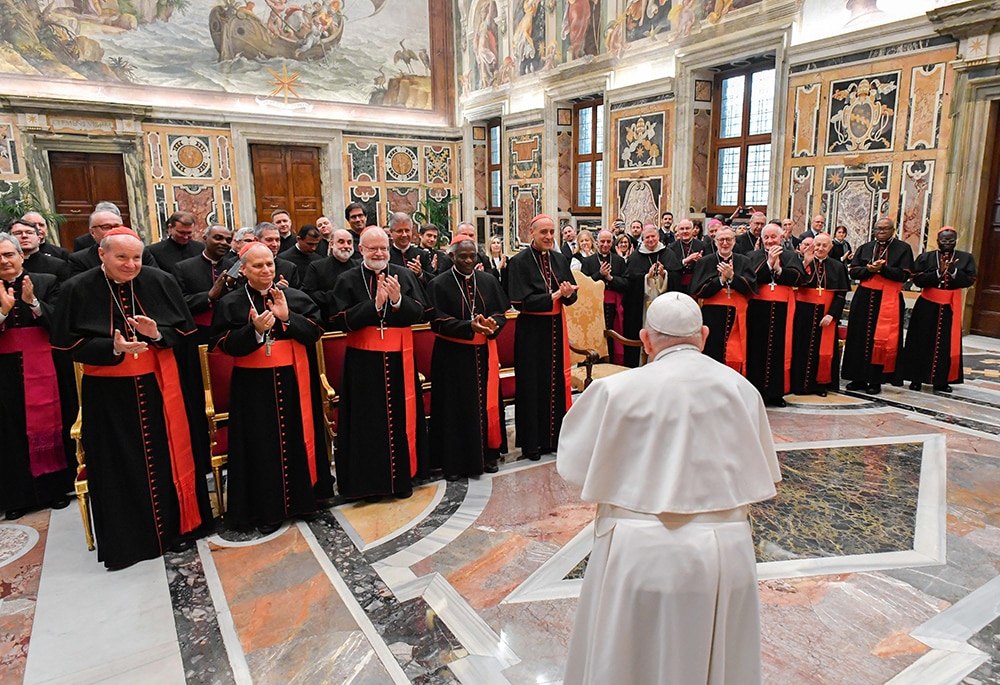

The pope gave a short but important speech to the full membership of the Dicastery for the Doctrine of the Faith last week. Most of it was excellent but there was one glaring omission.
First the good stuff. The pope used the occasion (Jan. 26) to clarify his intentions in approving the document Fiducia Supplicans in December, specifically as it relates to the blessing of persons who are in same-sex unions or other irregular unions. He emphasized that « these blessings, outside of any liturgical context and form, do not demand moral perfection to be received. » Blessings, like Holy Communion, are not a reward for the perfect but food for the journey.
The pope reemphasized the point in an interview with La Stampa. In response to those who object that persons in a same-sex union are living in an objectively sinful situation, the pope replied, « But we are all sinners. Why then draw up a list of sinners who can enter the church and a list of sinners who cannot be in the church? This is not the Gospel. »
Any fair reading of the Gospel would find it strange that sexual sins have achieved such a prominent place in people’s understanding of sin. How we treat the poor and the migrants should surely garner as much focus but I do not hear anyone at EWTN complaining that the church should not offer a blessing to, say, Rep. Elise Stefanik because she defends views on immigration that can accurately be described as inhumane and fascistic. I hope the congresswoman takes Communion as often as possible and I hope the grace the sacrament confers will help her to see the light and correct her ways.
The Holy Father was also right to insist that « Inasmuch as we are Christians, we must not tire of insisting ‘on the primacy of the human person and the defence of his or her dignity beyond every circumstance,’ » quoting Laudate Deum. Our sins degrade our human dignity but they do not remove it. Grace, the grace of the cross, removes the sins and grounds the dignity of the human person. The foundational divergence between this pope and his critics is that he insists God’s grace is at the heart of the Christian story, and they insist that human sinfulness, usually someone else’s sins by the way, is the heart of the story. The pope is right. Unambiguously right.
But not exhaustively right. Just as it is remarkable that a certain kind of conservative Catholic considers sexual sins uniquely antithetical to Christian life, it is also astounding that a certain kind of liberal Catholic thinks shedding traditional sexual mores is the very measure of Christian fidelity. It is not that one is right and the other wrong. It is that we all need to move beyond the conviction that pelvic theology is uniquely, comprehensively, and radically, the most important mark of Christian faith.
More importantly, the pope structured his short talk around three themes: sacraments, dignity and faith. Like Vatican II itself, he started with consideration of the sacraments. « In these days you have reflected on the theme of the validity of the sacraments, » the pope said. « The life of the church is nourished and grows through them. For this reason, special care is required on the part of ministers in administering them and in disclosing to the faithful the treasures of grace they communicate. » Again, the emphasis is on grace, on God’s activity, and how it nourishes us, not on how we build up or tear down the faith.
His comments about human dignity also reflected a key insight into this pontificate and those who oppose it. Reread the words already cited: « Inasmuch as we are Christians, we must not tire of insisting ‘on the primacy of the human person and the defence of his or her dignity beyond every circumstance.’ » How often do we fall short of this when we speak against our brothers and sisters in the faith? And, how often do debates about controversial issues reflect the degree to which one or both sides ignore the dignity of those with whom they contend?
The third word was « faith » and the pope began his treatment of it by saying, « In this regard, I would like to remember two events. » The events were the 10th anniversary of his programmatic apostolic exhortation Evangelii Gaudium and the forthcoming Jubilee year 2025. A key point of convergence among post-conciliar popes is this understanding that Catholic faith is rooted in the event of Jesus Christ, not in a series of propositions. Alas, some who invoke the memory of Popes John Paul II and Benedict XVI fail to grasp this, as do some who invoke Pope Francis. We Catholics can and should be protected from lapsing into ideology by the words we pray every day: « Blest is the fruit of thy womb, Jesus. »
What did the pope omit from his talk? He should have addressed the lack of consultation before Fiducia Supplicans. When you spend the better part of two months having to issue clarifications, you know you needed to do a better job preparing the text, or at least preparing the bishops of the world to receive the text. Consultations on major issues are vital and, in this instance, they did not happen.
The pope is free to approve documents and to make decisions as he sees fit. He is the universal pastor of the church. But if he wants the rest of us to embrace synodality, he should insist that the dicasteries that help him govern the church act in a more synodal fashion. The central themes of his pontificate can withstand the arrows shot at them from his opponents. But he needs to make sure he and his allies do not make avoidable, unforced errors.
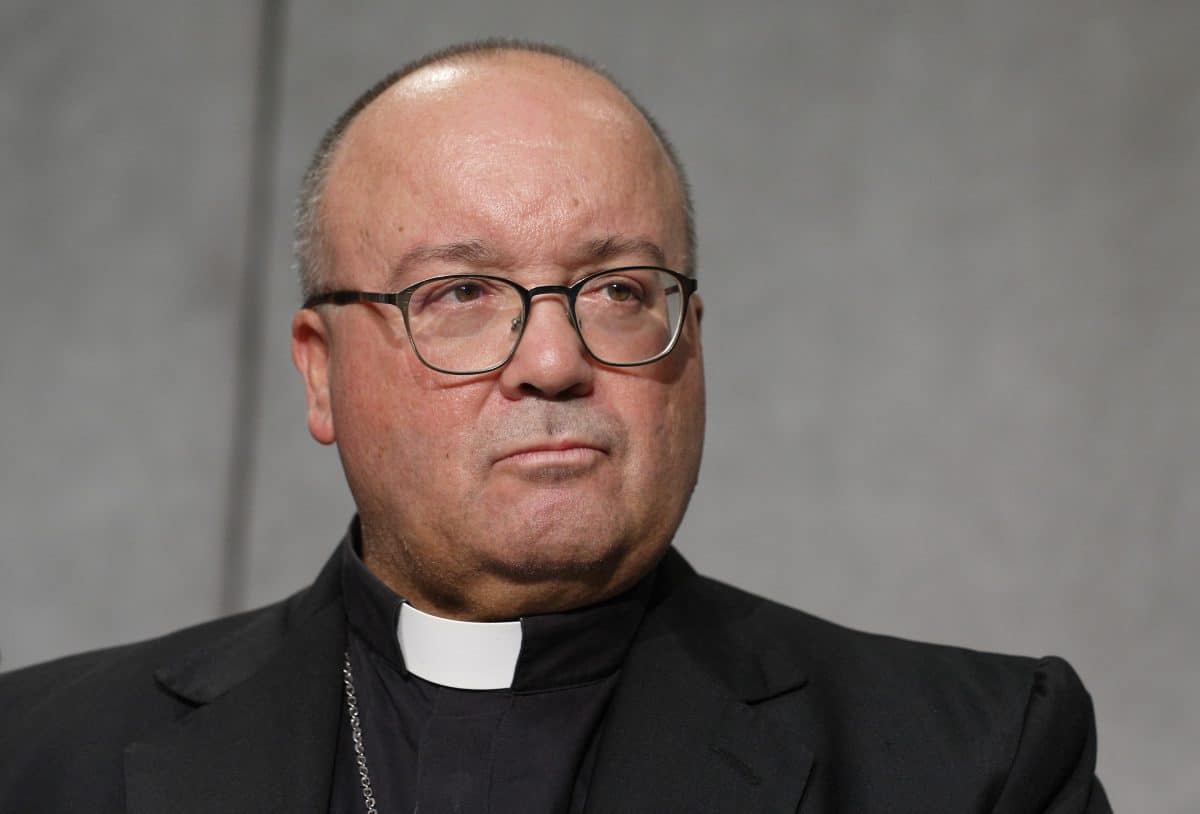
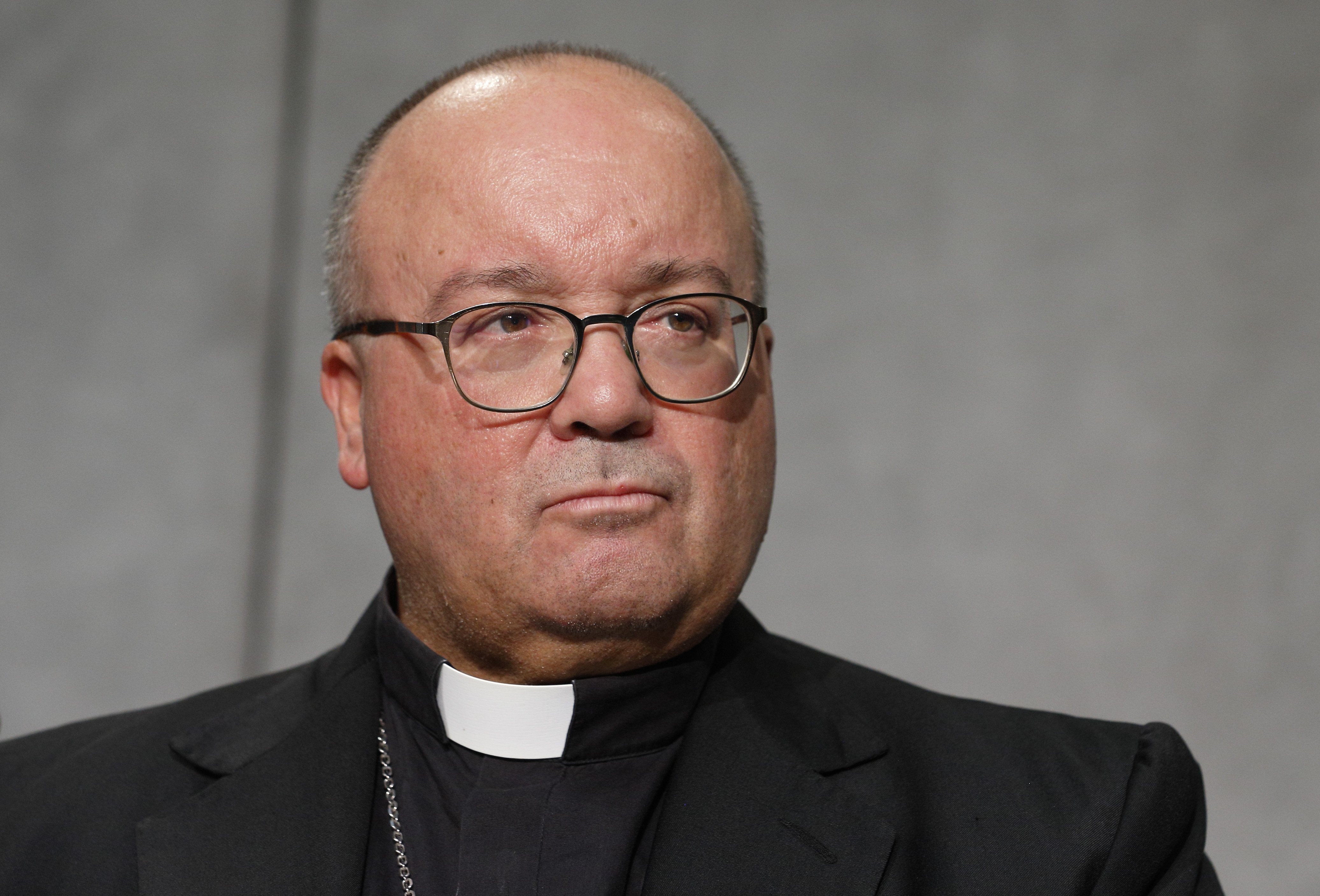
One of the Catholic Church’s leading doctrinal officials has reiterated his unusual call for the global institution to consider ending its millennia-long requirement that priests remain celibate, saying that allowing priestly marriage could be a means of preventing clerics from living dangerous double lives.
In an exclusive interview with National Catholic Reporter on Jan. 24, Archbishop Charles Scicluna said: « One of my worries is that people are put in a situation where they are comfortable with a double life. »
« This is not to diminish the beauty of celibacy or the heroic commitment of people who have accepted celibacy as a gift and live it, » said the archbishop, speaking in an interview at the Vatican’s Dicastery for the Doctrine of the Faith for NCR’s « The Vatican Briefing » podcast. « But I think it is good that we discuss it. »
Earlier this month, Scicluna — who serves as both the Archbishop of Malta and an adjunct secretary of the Vatican dicastery — made headlines when he said he believes it is time to revisit the church’s long-standing ban on allowing marriage for most of its clerics.
At the time, the archbishop was commenting on the lives of priests who have hidden relationships, which he said could be a « symptom » of priests « having to cope with » their celibacy requirement.
Advertisement
But in the NCR interview, Scicluna, who has also been tapped by Pope Francis to investigate claims of clergy abuse in places across the world, said that — not drawing any link between priestly celibacy and clerical abuse — this work has shaped his perspective.
« You realize when you travel a lot and you meet other people, that people find themselves in different states of life, » he said. « And this could be, could be — I’m not saying that this is an actual magic wand sort of thing — could be also something … worth discussing, » he said.
A proposal to greenlight the ordination of married priests in the nine-nation Amazon region of Latin America was one of the most intensely debated issues at the Vatican’s 2019 synod on the Amazon. Although the proposal received the necessary two-thirds majority vote for approval of the synod members at the end of the assembly, Francis has so far declined to move on the request.
A similar proposal was included in the final synthesis document of the 2023 October synod on synodality, in which Scicluna participated, and further discussion on the topic is expected when the synod reconvenes for a second session in October 2024.
« What you learn through experience is that you have to factor in human frailty, and the fact that people mature into different situations; they find themselves in a different place psychologically, spiritually, » said Scicluna. « This is something that … the church at the highest authority will have to decide. »
Scicluna’s remarks on « The Vatican Briefing » came in an interview timed to coincide with the five-year anniversary of Francis’ historic 2019 summit on clergy sex abuse, when the pope summoned the heads of the world’s Catholic bishops’ conferences to Rome to discuss the protection of minors.
One of the major outcomes of that meeting was the promulgation of a sweeping new church law, Vos Estis Lux Mundi (« You are the light of the world »), mandating for the first time that all priests and members of religious orders worldwide are obligated to report any suspicions of abuse or its cover-up.
While the law was initially adopted on an experimental basis, in March 2023, the pope made the law permanent and extended it to also apply to lay leaders who head international Catholic associations recognized by the Vatican.
Reflecting on its significance, Scicluna said the law is notable for providing a « special procedure that ensures and guarantees accountability, but also responsibility » for « how to investigate people in leadership. »
However, the archbishop also acknowledged that there are « pockets » within the church where the law is not fully implemented, and that more work remains.
« I think that the fact that we have the law is not like we’ve done our duty and this is like a job well done, » he said. « We have a law which is an instrument, whether we use it or not will depend on people in leadership, but also on the communities. »
Beyond mandating abuse reporting, Vos Estis also set up a new global system for the evaluation of reports of abuse or cover-up by Catholic bishops. It empowered archbishops to conduct investigations of prelates in their local regions, with the help of Vatican authorities.
Asked about criticism from abuse survivors and their advocates that the investigation system is effectively a form of self-policing, Scicliuna countered that « there are levels of accountability that are not only … in-house. »
In particular, he highlighted the fact that Vos Estis mandates that church authorities give cooperation to civil authorities.
« I think that the guarantee is always the disclosure not only to the church, but the statutory authorities, where the case allows for that and warrants that, » said Scicluna.
The archbishop also emphasized that beyond the new reporting obligations, another element of the law is that church leaders now have a specified « duty of care » for victims of abuse.
In a January 2023 interview with the National Catholic Reporter, Scicluna had previously called on the church to improve its treatment of abuse victims, especially with regard to following up when they file reports of abuse or cover-up.
During the new Jan. 24 interview, the archbishop repeated that need, saying: « We need to connect with victims in all phases of the process. »
« I think that if the church is not accountable, it’s not synodal. »
— Archbishop Charles Scicluna
« The victim has a right to report misconduct, they have a right to give their testimony and to offer their contribution to an investigation, but then they need to be accompanied and to be informed of the outcome of the case, » he continued. « Because that not only respects their dignity, but gives them peace of mind. »
Scicluna also commented on how the concept of accountability fits together with Francis’ vision for a synodal church, in which all Catholics are involved in leading together.
« I don’t think that there is any option away from accountability, » said the archbishop.
« I think that if the church is not accountable, it’s not synodal, » he continued. « I don’t think that a synodal church would be truly synodal — that is, walking together — if we’re not caring for each other and we’re not accountable to each other. »
How do I listen?
From your computer:
Click the « play » button inside this article to start the show. Make sure to keep the window open on your browser if you’re doing other things, or the audio will stop.
From your mobile device:
You can listen and subscribe to « The Vatican Briefing » from any podcast app. If you’re reading this from an iPhone or other Apple mobile device, tap this link to listen in Apple Podcasts. The podcast is also available on Spotify, at this link.
If you prefer another podcast app, you can find « The Vatican Briefing » there. (Here’s the RSS feed.)
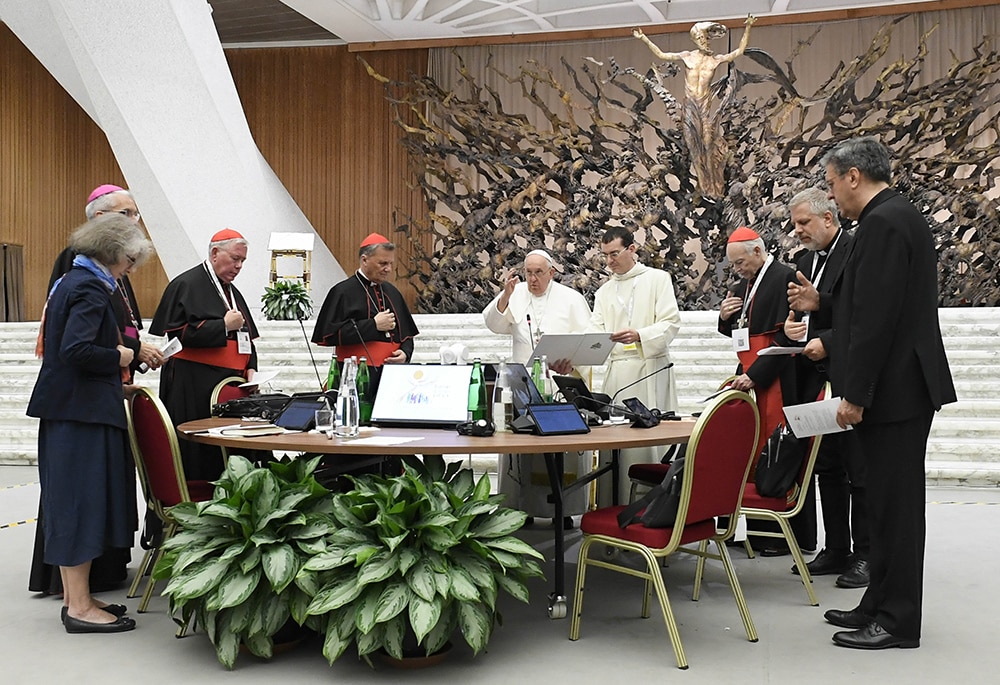

I was pleasantly surprised by the synthesis report, « A Synodal Church in Mission, » from last October’s first session of the synod on synodality. The full text is available here.
The report unabashedly calls for significant structural change — including, where indicated, a review of canon law and in other authoritative church documents.
Such changes could have profound implications for how governance and ministry function in a synodal church. Perhaps most surprising (to me at least) is the call for mechanisms of evaluation and accountability for priests, deacons and bishops and for an examination of the relationship between holy orders and jurisdiction.
The goal is to create more inclusive and accountable structures that will ensure the effective exercise of co-responsibility within the Roman Catholic Church.
In September 2018 I wrote a column suggesting theologian Leonardo Boff’s book Church, Charism and Power, offered the church a way out of clericalism.
I suggested convening a worldwide synod « at which representation from all the people of God would have deliberative voice alongside bishops. » It would include experts who would « recommend changes in canon law and in church policy to hold bishops accountable and integrate laity into decision-making so that we have deliberative voice (not just consultative) at every level. »
I can hardly believe such prescience. Thankfully, the Holy Spirit works in many hearts as well as my own.
Boff was among the first to listen to the Spirit’s voice in God’s people. In his 1985 Introduction to Church, Charism and Power he wrote: « There are powerful and living forces, particularly at the grassroots, that are not sufficiently recognized. … The grassroots are asking for a new structure, a new ecclesial division of labor and of religious power. For this, a new vision of the Church is necessary. »
There is reason to believe that Boff’s ecclesiology influenced Francis’ vision of synodality and church governance. Like Boff, Francis is famous for recognizing the Spirit at work in ordinary Catholics.
Below is a sampling of significant aspects of the synthesis report.
In the first (of 20) topical areas approved by two-thirds majority vote, synod members said that « synodality represents the future of the Church. »
The need for a growing as a synodal church occurs repeatedly throughout the 41-page text.
Topic 8 (« Church is Mission ») names a foundational agreement about the basis and necessity of co-responsibility:
The sacraments of Christian initiation confer on all the disciples of Jesus the responsibility for the mission of the Church. Laymen and laywomen, those in consecrated life, and ordained ministers have equal dignity. … The exercise of co-responsibility is essential for synodality and is necessary at all levels of the Church.
Topic 9 (« Women in the Life and Mission of the Church ») asks that:
[W]e avoid repeating the mistake of talking about women as an issue or a problem. Instead, we desire to promote a Church in which men and women dialogue together, in order to understand more deeply the horizon of God’s project, that sees them together as protagonists, without subordination, exclusion or competition.
Furthermore, there is a need for structural change:
Our synodal path shows the need for relational renewal and structural changes. In this way we can better welcome the participation and contribution of all … as co-responsible disciples in the work of mission.
In addition to ongoing consideration of female deacons, synod proposals call for inclusive language in liturgical texts, expansion of women’s access to theological studies, equal remuneration for pastoral work and allowing female judges to preside at canonical trials. Topic 8 also asks for consideration of lay preaching.
Topic 10 (« Consecrated Life and Lay Associations and Movements: A Charismatic Sign ») gives a shout-out to discernment models already used by most religious communities and acknowledges that our groups have been living synodality for a very long time:
The Christian community also recognizes and wishes to be attentive to the practices of synodal life and discernment that have been tried and tested in communities of consecrated life, maturing over the centuries. We know that we can learn from them wisdom in how to walk the synodal path.
One proposal calls for a revision « in a synodal manner » of Mutuae Relationes, a 1978 document addressing relationships between bishops and religious communities. In 2013 Pope Francis promised such an update in the wake of the disastrous Vatican attempt to discredit U.S. religious communities of women.
Topic 11 (« Deacons and Priests in a Synodal Church ») agreed that clericalism is an obstacle to ministry and mission. It says:
In a synodal Church, ordained ministers are called to live their service to the People of God in a disposition of proximity to people. … Above all, they are required to reconsider the exercise of authority, modelling it upon Jesus who, « though he was in the form of God, […] emptied himself, taking the form of a slave » (Phil. 2:6-7).
One courageous — and paradigm-shifting — proposal said:
We ask local churches to identify processes and structures that allow for a regular audit of how priests and deacons are carrying out roles of responsibility in the exercise of their ministry.
Another noteworthy proposal asks that priests who have left the active ministry be included in « pastoral services that recognize their formation and experience. » It is shocking that priests who left the active ministry are currently forbidden to serve as lectors and communion ministers, ministries commonly performed by laypeople.
Advertisement
Topic 12 (« The Bishop in Ecclesial Communion ») says:
As the visible principle of unity, he [the bishop] has, in particular, the task of discerning and coordinating the different charisms and ministries sent forth by the Spirit for the proclamation of the Gospel and common good of the community. This ministry is realized in a synodal manner when governance is accompanied by co-responsibility. …
One of the most substantive proposals suggests creating legal mechanisms for ensuring bishop accountability:
It is necessary to implement, in forms legally yet to be defined, structures and processes for regular review of the bishop’s performance, with reference to the style of his authority, the economic administration of the diocese’s assets, and the functioning of participatory bodies, and safeguarding against all possible kinds of abuses. A culture of accountability is an integral part of a synodal Church that promotes co-responsibility, as well as safeguarding against abuses.
The assembly also asked for a review of various authoritative teachings about « the relationship between the sacrament of Holy Orders and jurisdiction »:
[It] needs to be studied in greater depth. In dialogue with Lumen Gentium and more recent teachings such as [Pope Francis’] Apostolic Constitution Praedicate Evangelium, the aim of such a study would be to clarify the theological and canonical criteria underlying the principle of the shared responsibility of the bishop and to determine the scope, forms and implications of co-responsibility.
As next October’s second session of the synod unfolds, the jurisdiction issue is one to watch. If a corresponding proposal is sent to Pope Francis, it could have wide-ranging implications for church ministry and decision-making.
Given all of the above, there is good reason to hope that the synod on synodality will recommend substantive structural change to Pope Francis next October.
‘There is good reason to hope that the synod on synodality will recommend substantive structural change to Pope Francis next October.’
I hope I have piqued your interest in reading the synthesis report in its entirety.
If so, please consider continuing the conversation in your local church using available online resources.
The U.S. Conference of Catholic Bishops has issued guidelines that suggest holding two or three listening sessions during Lent and collaborating with Catholic affiliated groups and organizations.
A worksheet suggests choosing three priorities from the 20 topics covered in the synthesis and discuss concrete ways of implementing them in your own diocese or parish.
When the synod first opened, I was struck by the stunning image of lay women and men, bishops, priests and women religious gathered at roundtables.
It seemed a fulfillment of Chuck Lathrop’s much-loved 1977 poem, « In Search of a Roundtable. » Here is an excerpt:
For God has called a People,
not ‘them and us’
‘Them and us’ are unable to gather around,
for at a roundtable, there are no sides
And ALL are invited to wholeness and to food. …Roundtabling means no preferred seating,
no first & last,
no better,
no corners for ‘the least of these’
Roundtabling means being with,
a part of,
together,
and one
It means room for the Spirit and gifts
and disturbing profound peace for all.And it is we in the present
who are mixing and kneading the dough for the future.
We can no longer prepare for the past. …—Chuck Lathrop
[The full version is available here.]

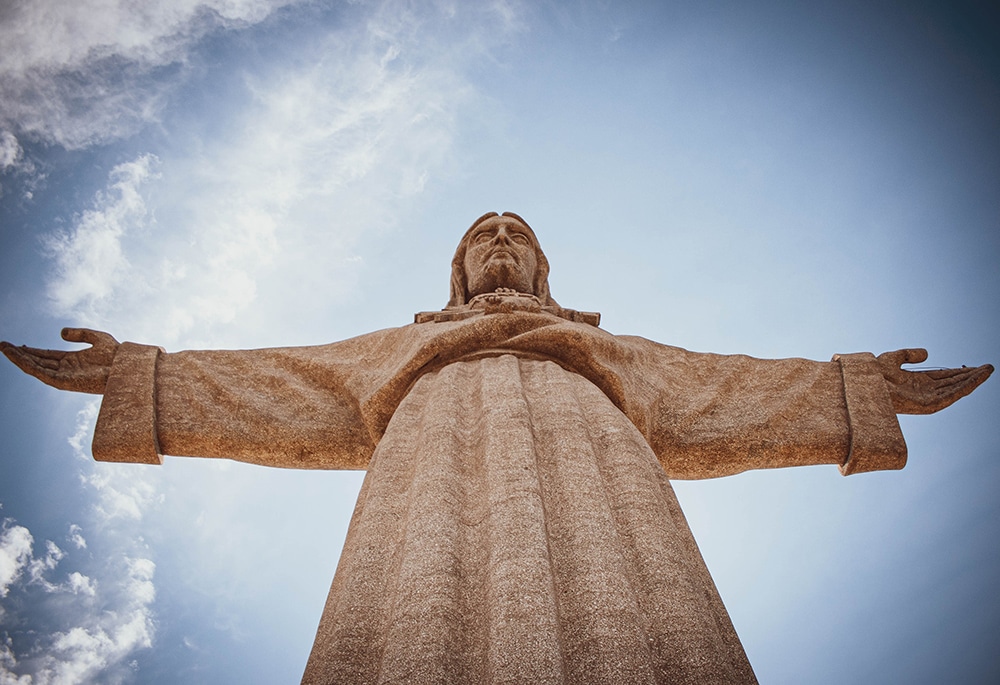

One of the more delightful cartoons I’ve seen lately shows a puzzled man standing in a secondhand store looking at a display of antique « The end is near » signs.
Religious traditions that believe that history is headed toward a destiny generally assume that the world will end; some think they can unravel signs of its coming — usually in the near future and to the detriment of their adversaries. Paul and his communities expected Christ to return in glory before most of them died. This helps us interpret much of his teaching, including his advice that it is better not to marry. Why start a family if the second coming is right around the bend? As time went on (and on and on), Christian communities began to adjust their expectations. The writing of the Gospels was one result of their adjustment; the written narrative assured that future generations could know Jesus as his companions did.
The early communities had to reorient their spirituality as they accepted the fact that Christ was not about to appear to judge the nations. They began to understand that Christ remained present to them and that they had a much larger and longer mission than they had expected. Paul was already moving in this direction when he called his community to be the body of Christ for their world (1 Corinthians 12).
This takes us from expectations of the end into the realm of prophecy — which is not a foretelling of the future, but a reading of God’s influence and desires for the here and now. In our reading from Deuteronomy, Moses promises the people that God will not abandon them, but rather continue to speak to them through prophets. As the early Christians discovered, the promise of prophets did not end with Jesus; just as his mission would continue, so too would prophecy. The belief that God continues to speak through prophets underlines today’s psalm refrain: « If today you hear God’s voice, harden not your hearts. » This call remains as appropriate today as it was from the times of Moses through Jesus.
That sounds nice and easy, but in reality, it is neither.
Discerning God’s action and desires requires us to be deeply grounded in tradition and profoundly open to the new. This is obvious from today’s Gospel. Mark depicts Jesus in a whirlwind of activity: teaching (Mark gives us no additional content), healing and battling demons. Curiously, rather than being brought to faith, the people who saw and heard Jesus ended up utterly confused. The least confused were actually his enemies — they understood what was at stake for them.
In today’s Gospel, Mark repeats two key ideas: the people were « astonished » or « amazed, » and Jesus taught with authority.
What does their bewilderment tell us? First, it makes it clear that Jesus was not what they expected. The folks in question had gone to listen to a teacher. This was hardly the first time they had heard someone preach in their synagogue. (In the days before the NBA, Hollywood and social media, gathering to listen to a sermon was a form of entertainment as well as a religious activity.)
What Jesus’ audience heard left them like children who had tasted only watery vanilla ice cream being taken to a Baskin Robbins; there was so much there that they couldn’t take it in. The only way people could explain it was to say that Jesus taught with authority, an authority that he authenticated in a successful skirmish with a demon. People saw that Jesus’ word was sufficient to banish an unclean spirit. To citizens of an occupied nation, people who had learned to endure their lot in life, who had grown accustomed to mediocre hopes, Jesus came at them like a thunderstorm in the desert, jolting them out of their tedium.
Having never expected anything like this, most people had no idea how to respond. Some were frightened, others threatened. But to those who would follow him, Jesus offered an amazing new take on life. He rooted his message in their traditions, yet, rather than close the book saying, « That’s all folks! » Jesus spurred them to hope that all the promises of old would come true — in ways so new that they would continually be astounded.
Mark wastes no time as he throws us into the middle of a world turning inside out. He shows us that bewilderment is good for faith; it can startle us into suspecting that there’s more afoot than we would ever dream of.
The end he wants us to see coming near is the end of low expectations — because the reign of God is at hand.